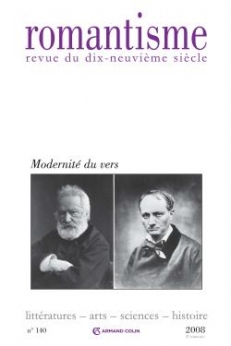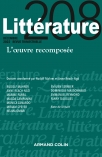
Romantisme n° 140 (2/2008)
Pour acheter ce numéro, contactez-nous
Recevez les numéros de l'année en cours et accédez à l'intégralité des articles en ligne.
L’époque romantique marque le début d’une extraordinaire période de transformation de la versification, parce que les règles draconiennes en vigueur depuis Malherbe sont à présent ressenties comme un carcan pesant. C’est aussi une période où les poètes se tournent vers le passé, littéraire et populaire, d’où ils exhument des formes oubliées ou méprisées, qu’ils remettent à la mode. L’attrait que tous éprouvent notamment pour la chanson a pour conséquence d’introduire dans la grande poésie des formes qui jusqu’alors étaient réservées à la chanson populaire et à la poésie de circonstance : la chanson poétique, terrain d’innovation formelle, n’a pas peu contribué à la renommée des poètes du XIXe siècle.
The romantic period marks the beginning of an extraordinary period of alterations to the versification, because the drastic rules, in force since Malherbe, are now felt as heavy regulations. Also, it is a period when poets turn towards a literary and popular past, from where they can unearth the forgotten and despised forms that they help to come back into fashion. The fascination that all of them, mainly, experience for the song has, consequently, the launching into the Great poetry of new forms which were, till then, reserved to popular songs and to the appropriate poetry : the poetic song, a brand new ground for a formal innovation, has hugely contributed in the fame of the poets of the 19th century.

